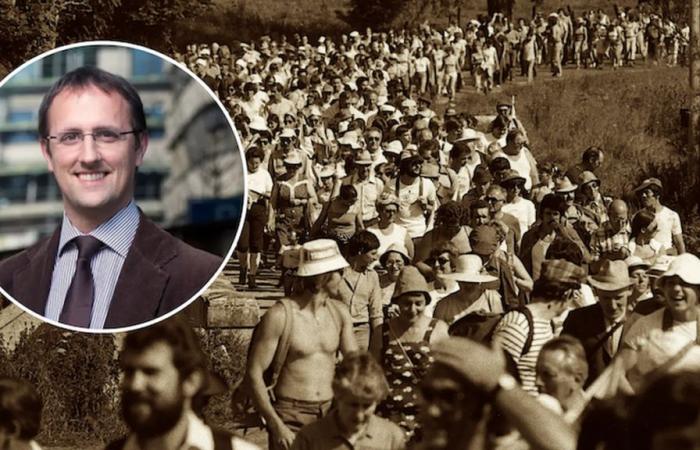In 1980, all of Vinet Rochat’s descendants took part in a march. Inset: historian Loïc Rochat.ch media / montage watson
All members of the Rochat family descend from a single ancestor, still celebrated today. The history of this family, well known in French-speaking Switzerland, has somewhat unusual origins.
Julian Spörri / ch media
In French-speaking Switzerland, we find some typical family names that are very much from our region. Favre, for example, but also Pittet or Rossier. But also the Rochats, who are present in large numbers in the canton of Vaud.
According to statistics, the three most common surnames in the canton of Vaud are Portuguese, due to the low diversity of Portuguese-speaking surnames: Da Silva, Ferreira and Pereira. But in fourth position we find the Rochats.
More about Romand surnames:
And all the Rochats in Switzerland have their origins in one and the same person: Vinet Rochat, who, in 1480, left Rochejean (in present-day France) to settle with his family 15 kilometers away, in the Joux Valley.
All cousins
Vinet Rochet’s story is a common one: although he wanted to work in the family business, it could only support one of his two sons. He then left for Switzerland to work in metal. “Vinet Rochat is the only ancestor of all the branches of the Rochat family, which spread across Switzerland,” explains the family historian, Loïc Rochat, who studied history at the University of Lausanne.
“All the Rochats are therefore cousins”
Loïc Rochat
This is not necessarily the case for all other people with identical surnames in Switzerland. This is partly because many surnames represent professions or places. Let’s take the three most common surnames in Switzerland, all of which are Alemannic: Müller actually translates to “miller”, Meyer to “sharecropper” (a type of farmer who takes care of livestock) and Schmid to “blacksmith”.
When surnames first appeared, some simply took the name of the occupation they performed. Those who worked at the mill became “Müller”, those who tended the cattle became “Meyer”, and those who worked in the forge became “Schmid” – with a whole host of possible spelling variations.
The Rochat march
On Saturday, the Rochats will celebrate their ancestor by walking the path that Vinet Rochat took in 1480. Several hundred people are expected to participate. More than 200 Rochat have already registered – including dual nationals from Brazil, the United States and the Netherlands, rejoices Loïc Rochat, who co-organizes the event.
This is not the first family gathering of this kind. In 1980, more than 2,000 people (including 600 Rochats) travelled from Rochejean to L’Abbaye in the Vallée de Joux. At the time, the President of the Confederation, Georges-André Chevallaz, even made the trip.
“The family spirit is very special, everyone knows this common history”
Loïc Rochat
The route between Rochejean and L’Abbaye is now marked for any hiker, with the Rochat coat of arms: a wheel.
More than 12,000 descendants
In 2027, Loïc Rochat will publish the complete family tree that he has been researching for decades. It consists of three volumes of 600 pages each. In total, he has found 12,500 descendants of Vinet Rochat and divided them into 60 family branches.
Even today, many Rochats live in the Vallée de Joux. In the town of L’Abbaye, which has 1,500 inhabitants, they represent almost 10% of the population. Since the 18th century, the family has spread throughout the canton of Vaud, but also to Geneva, Neuchâtel and the Jura.
Tax exemption for bread ovens
Loïc Rochat describes the Rochat family tree as “extraordinary” for such a large family. For the little ones, genealogical research is easier. But it was still necessary to find the right archives. And there, chance helped the Rochats.
In 1480, the Abbey convent had an economic interest in Vinet Rochat settling in the Vallée de Joux to work metal. As bait, the monks allowed the craftsman to install a bread oven in their home. In exchange, they offered him a… tax exemption. His descendants were even allowed to keep this privilege.
When the Bernese marched into the canton of Vaud in 1536, they encountered some curious inhabitants: they were all named Rochat and said they did not pay taxes thanks to the bread ovens. This perplexed the occupants of the canton of Vaud and prompted them to do some research, says Loïc Rochat. This is how the first local register recording the names of the inhabitants was born around 1600.
(Translated and adapted by Chiara Lecca)





